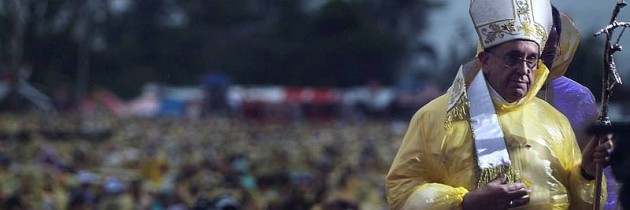Mercy in the Life of St. Oscar Romero
 Archbishop Oscar Romero came from modest circumstances in a village in El Salvador. His family did have somewhat greater financial circumstances than most others, but they were still poor. He attended a school in the village which only went to the third grade and then was tutored at home. During those years he worked as a carpenter with his father who had taught him the trade. After he decided he wanted to be a priest, he went to the seminary from age thirteen on. At one point he left the seminary for three months when his mother became ill. While he was home, Oscar worked in a gold mine with his brothers.
Archbishop Oscar Romero came from modest circumstances in a village in El Salvador. His family did have somewhat greater financial circumstances than most others, but they were still poor. He attended a school in the village which only went to the third grade and then was tutored at home. During those years he worked as a carpenter with his father who had taught him the trade. After he decided he wanted to be a priest, he went to the seminary from age thirteen on. At one point he left the seminary for three months when his mother became ill. While he was home, Oscar worked in a gold mine with his brothers.
After he was ordained, Fr. Oscar Romero worked in a village parish for 20 years. Eventually his superiors saw his talent with administration and his high level of pastoral care. Ordination to bishop followed and he was the Secretary-General for the Catholic Episcopal Secretariat of Central America. By the time he was appointed as Archbishop of San Salvador, he had had broad exposure to the repressive policies and actions of a number of national governments against the poor. But he remained traditional and conservative.
As Archbishop, Oscar was aware of the poverty and terrorizing of the poor by the military in his country. He was also aware that a number of the priests under him were organizing protests, teaching organizational skills to their parishioners, and some were advocating violence. For a number of years he advocated the unity and interior conversion of all as a way to remedy the injustices and bring forth mercy. Archbishop Romero was well loved by many families of the ruling class. He tried not to “rock the boat.” He was worried that would bring on more repression.
After a close priest friend, Rutilio Grande, was assassinated, Archbishop Romero stepped forward much more strongly. His homilies and weekly radio broadcasts then emphatically identified the marginalization and injustices and even ordered the perpetrators to put down their arms and refuse to take orders from their superiors. Romero visited and ate with both the rich and the poor. He baptized the babies of both social classes, often in the same groups, which infuriated the elite. He had very little support, including from church officials.
He was a loving and very pious man. He wrote in his diary that he examined his conscience every day and strove constantly to be a son of the Church. This was very difficult because many of the church hierarchy were of the wealthy class in power. They knew there was injustice and torture, but the official policy was tolerance. Active mercy was the last thing on their minds.
Archbishop Romero was suspected of being an extremist or at least of backing them. He was no such thing. In fact, he ordered the extremists, priests and laity, not to confront the governmental violence with violence. He further did not subscribe to the Latin American versions of Marxism, although he was accused of this. His entire focus was on the suffering of the poor and the peril of the souls of the perpetrators. On March 24, 1980, after attending a day of recollection for priests, Romero celebrated Mass in a hospital chapel. As he raised the consecrated Host, he was shot.
This was an unlikely man, called to something which was foreign to his background, personality, and his superiors. Romero did not go looking for controversy or seek to be famous. Rather, in his diary he wrote of his desire to follow Jesus and for holiness. He saw Jesus particularly in the faces of those suffering. His willingness to be available to God opened his heart to mercy.
Today he is recognized as St. Oscar Romero.
Read More












